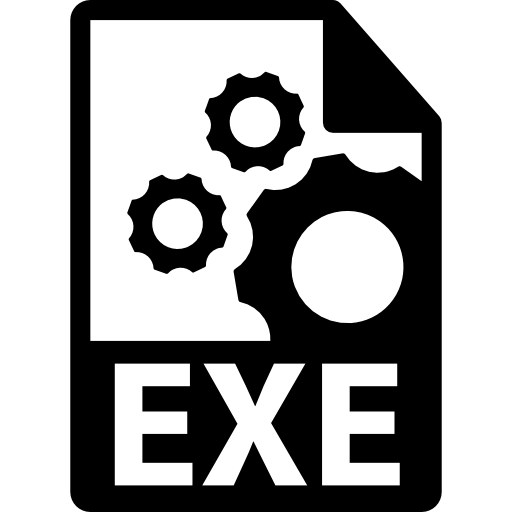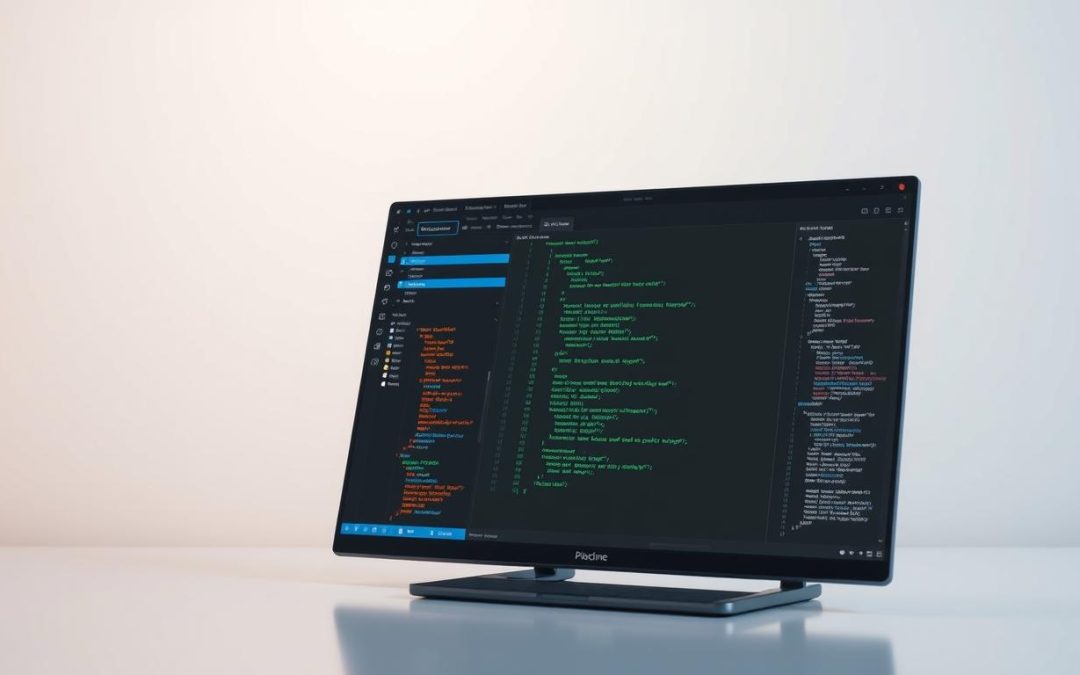Developers and software experts often want to uncover the secrets in executable files. An exe to source code converter is a powerful tool for this. It helps professionals decompile exe files, showing the programming logic and structure.
Converting executable files into source code has gotten better. Today’s online converters do it fast and securely. They turn binary files into programming languages that people can understand. Experts in research, cybersecurity, and software engineering use these tools to analyze software.
Now, professionals can decompile exe files with free online tools. These tools make complex reverse engineering easy. They support many programming languages and have user-friendly interfaces for extracting and analyzing code.
Key Takeaways
- Online exe to source code converters enable rapid software analysis
- Free tools support multiple programming language conversions
- Decompile exe processes help understand software architecture
- Professionals use converters for research and security purposes
- Advanced tools provide secure and efficient code extraction
Understanding EXE to Source Code Conversion
Turning executable files into source code is a complex task. It needs special knowledge and tools. Developers and security experts do this to understand how programs work, fix bugs, or find security issues.
Binary decompilation changes machine code back into something we can read. This complex task uses advanced algorithms. These algorithms can turn compiled code back into its original form.
Basic Principles of Binary Decompilation
The main steps in extracting source code are:
- Analyzing machine code instructions
- Identifying program logic and control structures
- Reconstructing high-level programming constructs
- Preserving original algorithmic intent
Common Use Cases for Source Code Recovery
Experts use executable to source code conversion for many reasons:
- Software maintenance and legacy system analysis
- Security vulnerability assessment
- Intellectual property research
- Compatibility testing
Technical Requirements for Conversion
To extract source code, you need certain technical skills. These include using powerful decompilation tools, knowing low-level programming languages, and having advanced reverse engineering skills.
Professional developers know that converting source code needs precision and deep technical knowledge.
Benefits of Using Online EXE to Source Code Tools

Developers and cybersecurity experts often use online tools to break down binary files and get back source code easily. Web-based conversion platforms make this process simple, without the hassle of installing software.
The main benefits of online EXE to source code tools are:
- Access from any device, without platform limits
- Quick cloud-based processing
- No need for expensive software
- An easy-to-use interface for complex analysis
These digital tools make it easier to get code from compiled files. Experts can now do complex code recovery tasks without big hardware costs. Being able to work on binary files from anywhere gives developers, reverse engineers, and security researchers a lot of flexibility.
Online tools make advanced code analysis easier for more people. They use cloud power to quickly and accurately handle tough decompilation tasks.
Top Free Online Exe to Source Code Converter Tools
Developers and cybersecurity experts often need to unpack exe files. They also analyze binary code for technical reasons. Luckily, the internet has many online tools that make this easier.
Choosing the best online converter is important. You need to know what features are key and what might be missing. Here are some top tools for recovering source code:
- IDA Free Decompiler
- Ghidra (NSA Open Source Tool)
- Reverse Engineering Tools
Popular Platform Features
When looking at online tools to unpack exe files, consider these important features:
| Feature | Importance | User Impact |
|---|---|---|
| Multi-language Support | High | Enables wider code reconstruction |
| Binary Analysis Depth | Critical | Determines code recovery accuracy |
| Output Formatting | Medium | Improves code readability |
Security Considerations
Security is key when dealing with executable files. Always check the reputation of online conversion sites. This helps keep your data safe during analysis.
“Not all online tools are created equal – prioritize security and accuracy in your code conversion strategy.”
User Interface Overview
Today’s online converters have user-friendly interfaces. They make decompiling executables easier. Look for tools with:
- Drag-and-drop file upload
- Clear navigation
- Instant preview options
Pro tip: Always use trusted platforms with strong privacy protocols when you analyze binary files online.
Legal Considerations When Decompiling Executables
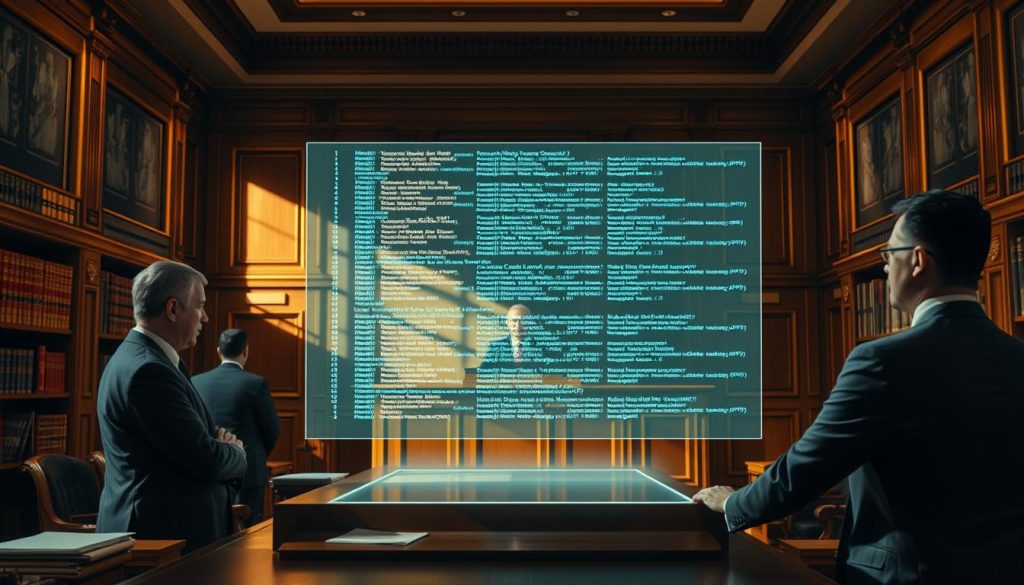
When working with binary translation and restoring lost source code, it’s important to know about intellectual property rights. Developers and researchers need to be careful when decompiling files to avoid legal trouble.
Decompiling can lead to legal issues based on several factors:
- Software licensing agreements
- Why you’re extracting the source code
- Copyright laws in your area
- If it’s for business or personal use
The laws about decompiling executables differ by region. In the United States, the Digital Millennium Copyright Act (DMCA) has rules about reverse engineering software.
| Use Case | Legal Status | Potential Risks |
|---|---|---|
| Personal Research | Generally Permitted | Minimal Legal Risk |
| Commercial Reverse Engineering | Restricted | High Legal Exposure |
| Educational Purposes | Often Allowed | Low Legal Risk |
Important legal rules say you must respect the original software’s intellectual property rights when doing binary translation. Before trying to restore source code from proprietary files, you need the right permission.
It’s vital for developers, researchers, and tech experts to understand the legal side of decompiling executables. Talking to legal experts and checking the software’s is the best way to navigate complex situations.
How Binary Translation Works
Turning executable files into source code is a complex task. An exe to source code converter uses special methods to read machine-level instructions. It then turns these into code that humans can understand.

Decompiling exe files is a detailed process. It involves breaking down binary code into something we can understand.
Disassembly Process Explained
Disassembly is the first step in getting source code back. During this step, tools do a lot of work:
- They analyze machine code instruction sets
- Map binary instructions to assembly language
- Identify memory allocation patterns
- Reconstruct the program’s logical flow
Code Recovery Techniques
Good exe to source code converters use different methods to get meaningful code:
- Static Analysis: Looks at code without running it
- Dynamic Tracing: Understands how the code runs
- Pattern Matching: Finds common programming patterns
Output Format Options
| Output Format | Characteristics | Best Use Case |
|---|---|---|
| High-Level Language | Readable programming syntax | Code review and modification |
| Assembly Language | Low-level machine instructions | Detailed system analysis |
| Intermediate Representation | Abstract code structure | Advanced reverse engineering |
The right decompile exe method depends on the project’s needs and the complexity of the executable.
Step-by-Step Guide to Unpack EXE Files
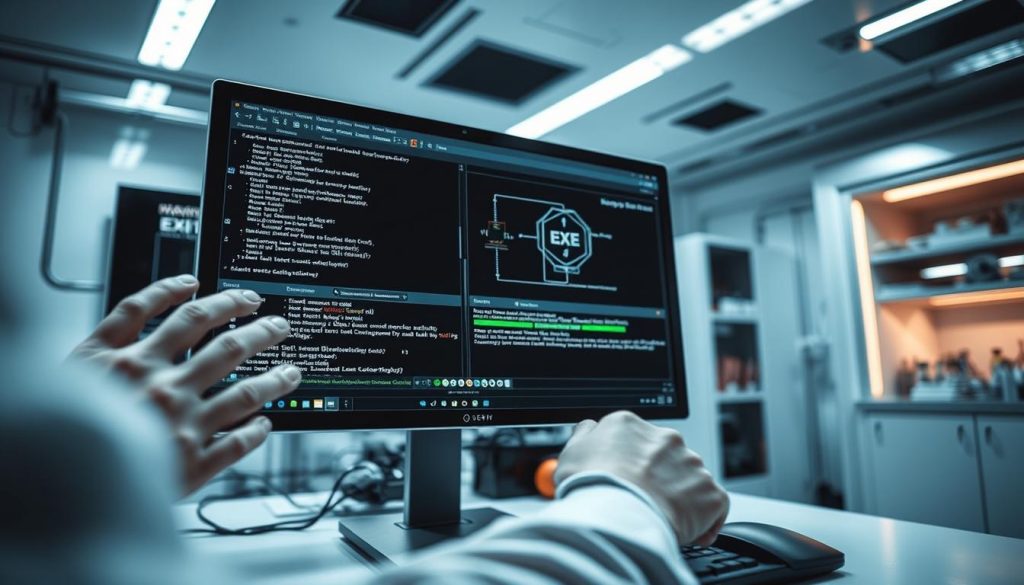
Getting source code from executable files is a detailed process. Developers and tech fans often unpack exe files to see how software works or to get back original code.
Before you start, make sure you have the right tools and know the basics:
- A reliable online converter or decompilation tool
- Original executable file with the right permissions
- Enough computer storage space
- A compatible operating system
The steps to get source code from an EXE are key:
- Pick a trusted online EXE unpacking tool
- Upload the executable file to the conversion site
- Choose the programming language you want the output in
- Set up decompilation options
- Start the source code extraction
When unpacking exe files, watch out for complexity levels. Some files have strong protection that makes getting source code hard. Professional tools usually give better results than simple converters.
Getting source code right depends on several things. These include how complex the file is, how it was compiled, and the decompilation method you use.
Best Practices for Binary Analysis
Analyzing binary code needs a careful plan for accurate results. Developers and security experts must learn key techniques. These help them reverse engineer files and find important information.
When you check binary files, some important steps can make your work better:
- Carefully check input data before you start
- Use strong decompilation tools with advanced features
- Set up detailed error tracking systems
- Keep detailed notes while reversing executable files
Code Quality Assessment Strategies
Good code quality checks involve several steps. Experts should look for weaknesses, slow parts, and structural issues in the code.
- Do static code analysis
- Run dynamic runtime checks
- Look for memory management problems
- Check if algorithms are efficient
Error Handling Methods
Good error handling is key when dealing with complex binary files. Developers should plan for problems and have strong ways to handle them during code extraction.
Proactive error management makes professional binary analysis stand out.
By using these strategies, tech experts can improve their binary analysis skills. They can do it with more precision and confidence.
Common Challenges in Source Code Extraction

Getting source code from executable files is tough. Developers and researchers face many technical hurdles. These challenges make it hard to get back lost source code.
The main problems in source code extraction are:
- Obfuscated executable structures
- Missing debugging symbols
- Complex algorithmic transformations
- Incomplete decompilation results
Developers trying to get back lost source code face big challenges. Not all executable files can be fully decompiled.
“Source code extraction is an intricate process that requires advanced technical expertise and specialized tools.”
Big technical hurdles to successful code recovery include:
| Challenge | Impact on Decompilation | Mitigation Strategy |
|---|---|---|
| Code Obfuscation | Reduces readability | Advanced reverse engineering techniques |
| Stripped Symbols | Limits variable identification | Signature-based recognition |
| Compiler Optimizations | Alters original code structure | Multi-pass decompilation |
Professional code recovery tools can help. But, users should know the decompiled code might not be perfect.
Security Measures When Converting Executables
Working with executable files means security is key. Experts must protect systems and data well. This is true when they disassemble and analyze binary files.
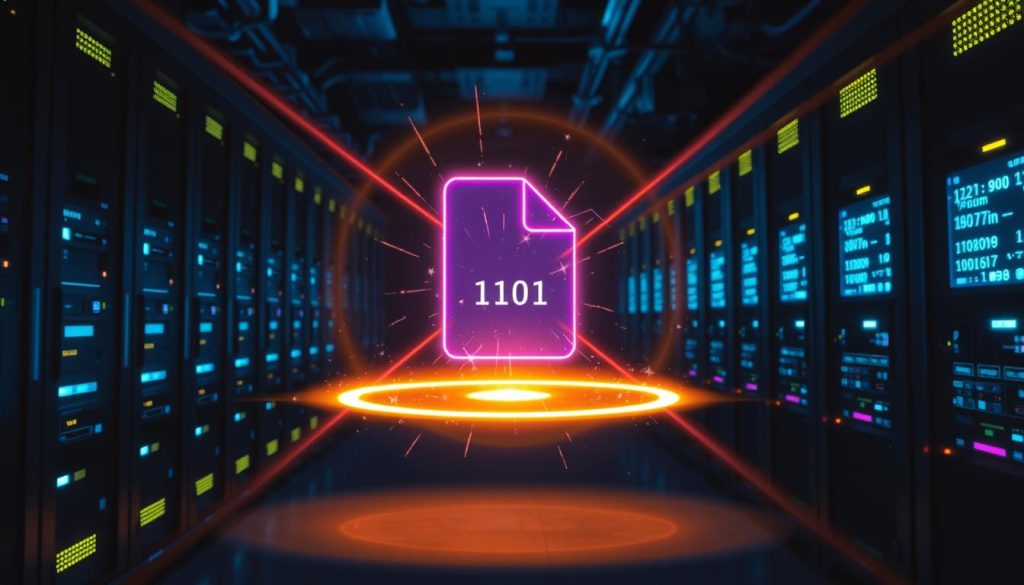
Digital forensics experts know how important strong security is. They face risks from unknown binary files. So, they use careful screening and protective steps.
Malware Detection Strategies
Good malware detection needs several layers:
- Use top-notch antivirus scanning tools
- Set up sandboxed environments for file analysis
- Do detailed static and dynamic code checks
- Apply reputation-based filtering systems
Data Protection Protocols
Protecting sensitive info is vital when disassembling binary files. Experts should follow these steps:
| Protection Method | Key Features |
|---|---|
| Encryption | Secure file transformations |
| Access Control | Limit who can manipulate files |
| Isolation | Keep analysis in separate areas |
“Security is not an option, it’s a necessity in binary file analysis.” – Cybersecurity Experts
Being proactive with security greatly lowers risks in converting and analyzing executable files.
Advanced Features of Code Recovery Tools
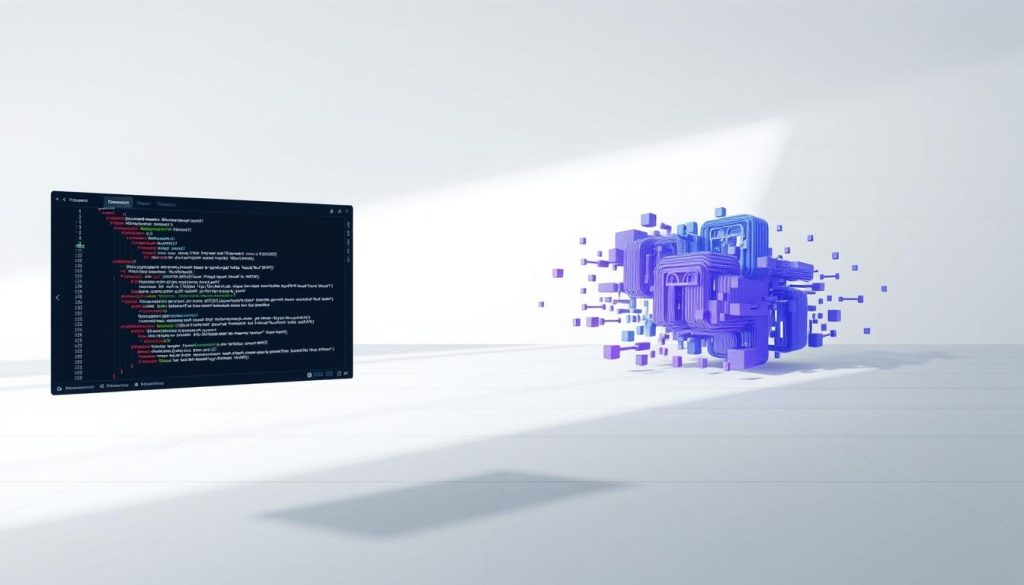
Modern exe to source code converter tools have changed how developers work with binary files. These tools can turn complex executable files into easy-to-read source code. They do this with great accuracy.
These advanced tools have powerful features that make decompiling better:
- Automated pattern recognition algorithms
- Intelligent code structure reconstruction
- Multi-language output generation
- Real-time syntax optimization
The best exe to source code converters use machine learning. They can guess and rebuild the original programming logic with amazing accuracy. This helps bridge the gap between compiled executables and their source code.
“Advanced code recovery is not just about translation, but understanding the intrinsic logic of compiled software.” – Software Engineering Quarterly
Some key tech advancements in code recovery tools are:
- Deep semantic analysis
- Contextual code reconstruction
- Intelligent variable name restoration
- Comprehensive dependency mapping
Now, developers and researchers can open up complex executable files with great detail. Code recovery is key in software reverse engineering and keeping old systems running.
Comparing Online vs Desktop Decompilers
Developers and researchers often face a big decision when picking between online and desktop decompilers. The choice between web-based and installed software tools greatly affects how well an exe file can be decompiled.
Choosing the right decompilation tool means knowing the main differences in performance and ease of use. Each method has its own benefits for turning executable files into source code that can be read.
Performance Metrics Comparison
When looking at decompile exe tools, how well they perform is key. Desktop decompilers usually offer:
- Faster processing speeds
- More robust binary translation capabilities
- Advanced configuration options
- Higher accuracy for complex executables
Accessibility Considerations
Online decompilers are great because they are easy to get to. They offer:
- No installation requirements
- Platform-independent functionality
- Instant access from any device
- Lower resource consumption
The best choice depends on what your project needs, how much power your computer has, and how complicated the executable is.
Troubleshooting Conversion Errors
Developers often face challenges when trying to get source code from executable files. Knowing common conversion errors helps make the unpack exe process smoother. It also boosts code recovery efficiency.
Key challenges in source code extraction fall into several main categories:
- Incomplete decompilation results
- Syntax parsing errors
- Compatibility mismatches
- Encrypted executable barriers
To solve these issues, a systematic approach is needed. Developers should focus on specific diagnostic strategies when extracting source code:
- Verify original executable integrity
- Check decompiler compatibility
- Analyze error logs thoroughly
- Experiment with alternative conversion tools
Technical considerations are key to successful exe to source code conversion. Different programming languages and compilation techniques affect decompilation accuracy.
| Error Type | Potential Solution | Complexity Level |
|---|---|---|
| Partial Decompilation | Use multi-stage decompilers | Medium |
| Syntax Reconstruction | Manual code review | High |
| Obfuscated Code | Advanced reverse engineering tools | Advanced |
Pro tip: Always maintain backup copies of original executables before attempting source code extraction to prevent potential data loss.
Successful unpack exe operations require patience, technical skill, and the right tools and techniques.
Optimizing Decompiled Source Code
When you restore lost source code or reverse engineer executable files, the initial output often needs a lot of work. Developers must use smart strategies to make the raw decompiled code clean, efficient, and easy to read.
Effective code optimization involves several key techniques. These can greatly improve the quality of the recovered source code.
Advanced Code Cleanup Strategies
Cleaning up decompiled code needs a careful plan:
- Remove redundant generated code segments
- Standardize naming conventions
- Eliminate dead or unreachable code blocks
- Restructure complex logic patterns
Performance Enhancement Methods
To make reverse engineered executables more efficient, developers should:
- Algorithmic optimization
- Improve memory management
- Reduce computational complexity
- Use efficient data structures
By using these detailed techniques, developers can turn raw decompiled code into strong, high-performance software. This software meets professional standards.
Conclusion
Exploring exe to source code converter technologies shows a complex digital world. Developers and cybersecurity experts use these tools to analyze binary files. They also understand legacy systems and find software vulnerabilities.
Decompiling executable files is more than just extracting code. It’s a mix of technical skills, legal rules, and advanced software engineering. Today’s exe to source code converters help reverse engineer software. This lets researchers dive deep into software structures.
As tech grows, so will the tools for analyzing binary files. Developers and security experts need to keep up with new methods. They must also know the right use of these tools to innovate and improve digital security.
The future of exe to source code conversion looks bright. We’ll see better algorithms, more accuracy, and new features. These advancements will change how we work with compiled software. By using these technologies, professionals can explore new areas in software development, cybersecurity, and digital forensics.
